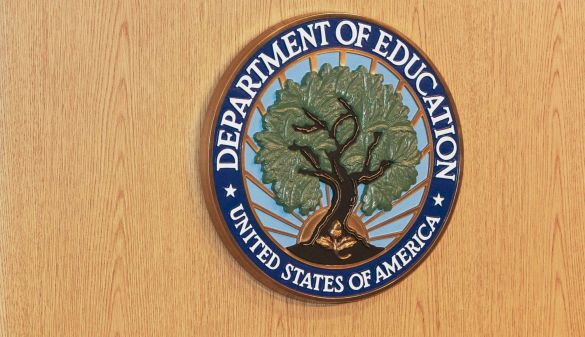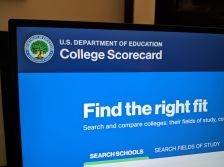Education Department now taking applications for OER higher ed grants
The Education Department has issued a notice in the Federal Register that it is now accepting applications for grants to set up pilot programs for open educational resources (OER), or “open textbooks,” as the department calls them. The application deadline is Aug. 29.
Congress included $5 million in funding for these pilot programs for fiscal 2018, with the aim of bringing down the expense of college textbooks. Grant recipients would be challenged with building an OER program that fills a specific need in the higher ed market.
In the notice, the department called attention to the need for open textbooks used by students in career and technical education. “Technical textbooks are among the more expensive books that students must purchase, and they often must be updated frequently to keep pace with changing technologies, which adds to the costs,” the notice reads. The need for frequent updates also limits students’ ability to purchase used books at lower prices, it said.
The department announced the OER grant opportunity the same day it issued a notice to community colleges about grants to make technological upgrades to their cybersecurity education programs.
The open textbook grant program sets “three absolute priorities and one competitive priority.”
Absolute priority No. 1 is “improving collaboration and dissemination through consortia arrangements.” Applicants must propose consortium projects that include at least three institutions of higher education and engage employers or workforce stakeholders and/or nonprofit or community organizations as participants.
These applicants must explain how the consortium will work to reduce the cost of textbooks that contain content that either aligns student learning objectives with the skills or knowledge required as part of a degree pathway, or, for career and technical postsecondary programs, meets industry standards established for in-demand sectors and occupations.
Absolute priority No. 2 is “addressing gaps in the open textbook marketplace and bringing solutions to scale.”
Applicants must propose comprehensive plans to:
- Identify and assess existing OERs in a subject area or credential pathway before creating new ones;
- Focus on creating and expanding education and training materials that can be taken to scale for a broad range of students — within the consortium members’ institutions and beyond — in high-enrollment courses or preparing for in-demand occupations;
- Create protocols for reviewing any open textbooks created or adapted, for accuracy, rigor and accessibility for students with disabilities; and
- Provide information about the results of the project to other higher education institutions, including promoting the adoption of any open textbooks created or adapted during the project.
The notice states that grant funds can be used for professional development “to help build capacity and expand the use of open textbooks for any faculty and staff members.”
Absolute priority No. 3 is “promoting degree completion,” by developing or building upon open textbooks along a degree program’s course sequence (e.g., Course 101, 201, 301), for high-enrollment programs, and/or courses along an associate’s degree track in one or more career and technical education fields. This priority includes a requirement for plans to promote and track the use of open textbooks, including estimating the cost savings for students, assessing the open textbooks’ impact on student outcomes, and updating the textbooks beyond the funded period.
The competitive priority, which will give applications additional points, is that applicants’ projects should integrate technology-based strategies, such as artificial intelligence and adaptive learning, to facilitate personalized learning.
The notice states that the department only plans to award up to three grants, which may not appear sufficient to have a real impact. But Nicole Allen, director of open education for SPARC, a group committed to improving access to data and educational materials, told EdScoop in March that existing OER grants have saved students, on average, more than 10 times the original investment.
Reach the reporter at pwaitster@gmail.com and follow her on Twitter @edscoop_news .




